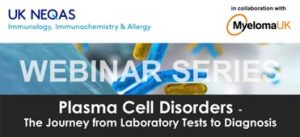Laboratories play a crucial role in the diagnostic pathway for myeloma patients, acting as a vital communication link between healthcare professionals.
Accurate and timely diagnoses are paramount in myeloma, and laboratories play a pivotal role in achieving this goal. Recognising the critical need to support laboratories, Myeloma UK has developed two free resources: the Monoclonal Gammopathy Lab Tool and the Plasma Cell Disorders Webinar Series.
Revolutionising diagnosis: Introducing the Monoclonal Gammopathy Lab Tool
To assist labs in improving their monoclonal gammopathy testing service, Myeloma UK has launched the Monoclonal Gammopathy Lab Tool.
Developed in collaboration with NHS experts from immunology, biochemistry, haematology, and UK NEQAS (UK National External Quality Assessment Service), this tool addresses the need for timely and accurate myeloma diagnosis.
Timely myeloma diagnosis relies on laboratories performing the correct tests and flagging abnormal results to clinicians. A 2017 survey of UK laboratories identified significant variations in the quality of testing, the experience of staff, and the reporting of myeloma results within the laboratories.
In response, Myeloma UK developed the tool, designed to help labs identify areas of good practice and areas of improvement and provide guidance on the following key aspects:
- Ordering of tests
- Analytical testing of samples
- Interpretation and reporting of results
Accompanied by a case study showcasing how an NHS lab performed against the guidance, this tool serves as an essential resource for laboratories.
Impact and recognition of the Monoclonal Gammopathy Lab Tool
Knowledge exchange and collaboration: Plasma cell disorders webinar series
In March 2023, Myeloma UK partnered with UK NEQAS to deliver four free educational webinar series, “Plasma Cell Disorders – The Journey from Laboratory Tests to Diagnosis”. They cover the Monoclonal Gammopathy Lab Tool, MGUS, and AL amyloidosis.
These webinars focus on defining the different types of plasma cell disorders, deciding when and how to investigate and highlighting tools to assist in their investigation and diagnosis.
Expert speakers lead the sessions, and the final webinar allows for an engaging panel discussion and Q&A session with delegates. We also hear the patient’s perspective on receiving a diagnosis of a plasma cell disorder.
Access the webinars for free through the following links:
- “Myeloma Lab Best Practice Tool – What’s It All About?” (Dr Fenella Willis & Dr Ross Sadler)
- Monoclonal Gammopathy of Undetermined Significance (MGUS) (Dr Karthik Ramasamy & Mark Davies)
- “AL Amyloidosis – Is This Serious Doctor?” (Dr Shameem Mahmood & Janet Gilbertson)
- Panel Discussion With Questions From Delegates (Dr Ross Sadler, Dr Fenella Willis & Dr Karthik Ramasamy)

